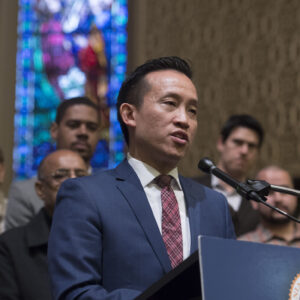City Attorney and County Counsel praise the Court’s decision to allow the lower court decision to stand, rejecting an Arizona-led effort to intervene in litigation involving obsolete Trump immigration rule
SAN FRANCISCO (June 15, 2022) — San Francisco City Attorney David Chiu and Santa Clara County Counsel James R. Williams issued the following statements today after the United States Supreme Court dismissed as improvidently granted their writ of certiorari in Arizona v. San Francisco. The Court’s decision means that the Ninth Circuit U.S. Court of Appeals’ previous decision will stand and the Arizona-led effort to intervene to defend the Trump Administration’s “public charge” rule failed.

The “public charge” rule, which the Biden Administration has since rescinded, would have instituted a wealth test for immigrants entering the United States or going through the naturalization process, creating a chilling effect on participation in public benefit programs.
“I am pleased the Court allowed the Ninth Circuit’s decision to stand and saw through Arizona’s cynical attempt to defend an obsolete, yet xenophobic, rule,” said San Francisco City Attorney David Chiu. “Regardless of today’s decision, the Biden Administration revoked the public charge rule, and no one should fear seeking the assistance and programs they need. In San Francisco and California, we will continue to honor our legacy of welcoming immigrants from all backgrounds and fight any attempts to institute a wealth test for citizenship.”
“The Supreme Court made the right decision today not to support the states’ efforts to continue to defend a rule that no longer even exists,” said Santa Clara County Counsel James R. Williams. “As courts across the country agreed, the Trump Administration’s public charge rule was illegal. But it wasn’t just illegal, it was a harmful and shortsighted policy that pushed immigrants and their families away from public health care and services that promote the health and wellbeing of our entire community. Given the Court’s decision to dismiss Arizona’s appeal today, we hope that Arizona and its coalition will finally accept that the Trump Administration’s public charge rule is over and done with.”
Background
Under the Trump Administration, the U.S. Department of Homeland Security announced a rule on “Inadmissibility on Public Charge Grounds” that would have rewritten nearly 140 years of legal precedent. The “public charge” rule sought to radically expand the grounds upon which a person could be deemed likely to become a “public charge,” and thus denied a green card or entry into the United States. By design, it would have coerced individuals to forgo or withdraw from critical public benefits and care.
San Francisco and the County of Santa Clara jointly filed the first case in the nation challenging the public charge rule. The Counties were later joined by two coalitions led by the States of California and Washington that also challenged the rule. The parties secured preliminary injunctions in October 2019 that were later upheld by the Ninth Circuit U.S. Court of Appeals. Based on similar arguments, a federal district court in Illinois entered a final judgment in a separate case vacating the rule nationwide.
The Trump Administration sought review of the Ninth Circuit decision in the U.S. Supreme Court, but that case was eventually dismissed after the Justice Department, under the Biden Administration, dropped the case and announced the administration would not implement Trump’s rule. As a result, the rule no longer exists.
In 2021, a coalition of states, led by Arizona, sought to intervene in the Ninth Circuit in an attempt to continue to defend the “public charge” rule even after the Biden Administration had ceased defending it. The Ninth Circuit denied that request, and the states appealed that ruling. The U.S. Supreme Court granted review on the question of whether the states should have been permitted to intervene in the litigation.
Today, in dismissing the case, the Supreme Court allowed the Ninth Circuit’s decision denying Arizona’s petition to intervene to stand.
###
